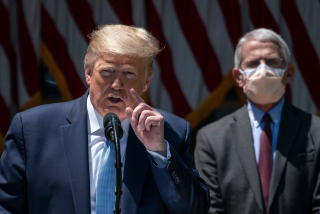Political Title Wave Sweeps U.S. on What to Call Bush
- Share via
WASHINGTON — The day after Florida certified Republican George W. Bush the winner of its all-important presidential electoral votes, a delicate question of political semantics emerged: What should he now be called?
To conservative newspaper editorialists and many Republicans, there was no doubt. The Texas governor, they declared Monday, is now President-elect Bush.
Liberal opinion makers and most Democrats were equally convinced that it was premature to give Bush the imprimatur of that title--and the public legitimacy it confers--in an election that the Democratic candidate, Vice President Al Gore, still is contesting.
Those in the middle who sought guidance were not helped by Bush, even though he claimed victory Sunday night and announced he was officially launching a White House transition effort.
As he arrived at his office in Austin, Texas, on Monday morning, Bush greeted reporters cheerfully but ignored their shouted questions, including one that asked: “Mr. Bush, what are we supposed to call you?”
Just before noon, he emerged, en route to the University of Texas for a workout. Asked by a reporter from the Austin American-Statesman how he should be addressed, a smiling Bush replied: “Sir, at least in your case!”
An aide who answered the phone at Bush headquarters in Austin told a reporter: “We’re still referring to him as governor.” That was also what Dick Cheney, Bush’s running mate, called him Monday during comments on the transition effort.
Associated Press wrote that Bush had taken on “the work, if not the title, of president-elect.” Some news organizations simply referred to Bush and Cheney as Republicans or the “Republican nominees.”
Even the beginnings of linking “president-elect” with Bush’s name could pose a problem for Gore in the public-relations battle that both sides acknowledge remains critical in the overall war for the White House.
Republicans are “doing everything they can to legitimize ‘the Bush presidency’ and de-legitimize ‘the Gore challenge,’ ” said Allan J. Lichtman, a presidential historian at American University in Washington. “And this title, ‘president-elect,’ becomes important in that. The more it becomes common parlance, the more people think [the election] is over.”
Technically, Lichtman noted, the Constitution does not provide for a president-elect until Congress convenes in early January to count the votes cast by the electoral college. At that point, a winner is officially declared.
But such mechanics have been glossed over in modern times, with the winner on election day immediately being termed president-elect. In this election, that pattern was broken when Gore, speaking with Bush by telephone, retracted an initial concession in the early hours of Nov. 8 and then announced he would await a full count of Florida’s votes. Gore now contends that such a count has not occurred, and he is seeking redress in court.
On Monday, many conservative editorialists, including those of the Wall Street Journal, declared Bush president-elect. The Washington Times, saying that Bush had batted “four-for-four” in counts and recounts, asserted: “By now, Mr. Bush has most certainly earned the title.” The Indianapolis Star said the same in an editorial headlined, “Time to Unite Behind a President.”
The Los Angeles Times adopted a more cautious appraisal in an editorial that, in the headline, declared the election results “Official but Not Over.” Like The Times, many newspapers were waiting on court rulings to declare an outcome.
The title of president-elect was used frequently--but not universally--by congressional Republicans after Sunday’s certification of the Florida vote. Sen. John W. Warner (R-Va.) called Bush the president-elect on CNN--a reference sharply disputed by Sen. John F. Kerry (D-Mass.) on the same show.
Senate Majority Leader Trent Lott (R-Miss.) said in a news release: “I pledge to work with President-elect Bush to bring the American people together in a sense of mission and commitment to achievement.” House Majority Whip Tom DeLay (R-Texas) also used the title in a statement he put out; one of his aides suggested that “media bias” was preventing most news organizations from following suit.
But Sen. Bill Frist (R-Tenn.), Bush’s point man in the Senate, refrained from using the title. Frist predicted that its widespread use would come to Bush soon enough, springing not from politicians but the public.
“The pulse of the American people will move very quickly over the next 48 hours toward calling him president-elect,” Frist said. “The media’s dragging its feet a little bit behind where the public is today. But the American people are going to drive it.”
*
Times staff writer Edwin Chen in Austin contributed to this story.
More to Read
Get the L.A. Times Politics newsletter
Deeply reported insights into legislation, politics and policy from Sacramento, Washington and beyond. In your inbox twice per week.
You may occasionally receive promotional content from the Los Angeles Times.








